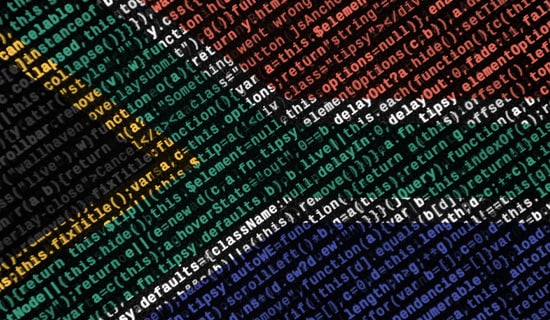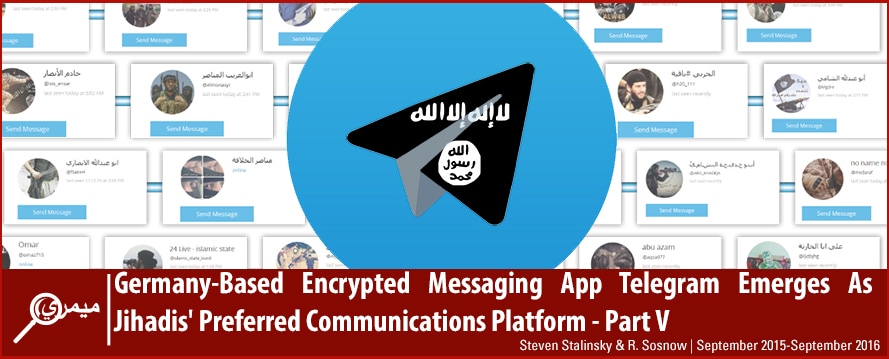Table of Contents
1: Telegram Emerges As Jihadis' Preferred Encryption Communications Platform
- Introduction
- How Jihadis Are Using Telegram: Recruiting, Encouraging Lone Wolf Attacks, Releasing Official Content About Jihadis' Use Of Telegram And Its Ramifications
- About Telegram
- U.S., European Officials Reach Out To Durov, Sound Alarm About Telegram
- Telegram Timeline September 2015-September 2016
- 2016 Arrests Of Jihadis Worldwide Using Telegram
- Telegram CEO Durov On Jihadi Use Of His Platform: Denials And Excuses
- MEMRI Recommendations For Removing Jihadi Content On Telegram
2: MEMRI Research Documents Jihadi Use Of Telegram
- Jihadis Shift To Using Telegram's Private Channels
- Jihadis Use Private Groups On Telegram
- Top French ISIS Recruiter And Executioner Rachid Kassim On Telegram: Promoting, Coordinating, And Encouraging Attacks Via Text, Images, Audio, Video
- Islamic State (ISIS): Official Releases; Sheikhs, Writers And Operatives; ISIS And Pro-ISIS Channels; Encouraging Lone-Wolf Attacks In The West; Technical Tips For Fighters And Sympathizers; Hacking Groups, Including Release Of "Kill Lists"
- Al-Qaeda: Al-Qaeda Central; Al-Qaeda Media Organizations; Al-Qaeda In The Arabian Peninsula (AQAP); Al-Qaeda In The Islamic Maghreb (AQIM); Al-Shabab Al-Mujahideen
- Jabhat Al-Nusra/Jaysh Fath Al-Sham: U.S.-Designated Terrorist Cleric Mustafa Muhammad, Media Groups, Foreign Fighters
- Hizbullah: Al-Manar TV Launches Telegram Channel
- Taliban: News Updates, English-Language Channels, Official Statements
- Turkestan Islamic Party (TIP): Urging Xinjiang Muslims To Join Jihad, Multiple Channels, News Of TIP Fighters In Aleppo Battles; Jihadi Music Videos
- Hamas And Gaza: Al-Qassam Martyrs Brigade Promotes Jihad And Martyrdom, Manuals For Stabbing Attacks, Bomb-making; Fundraising For Weapons To Target Jews
- Other Jihadi Activity On Telegram - Internet Archive, Nasheeds, Well-Known Jihadi Figures
Introduction
The following is Part V in MEMRI's series on jihadis' use of encryption technology. Since the publication of Part IV of this series, on June 16, 2015, the Germany-based encrypted messaging app Telegram has emerged as jihadis' preferred app for encrypted communications. Not since jihadis began joining Twitter en masse has there been such a development.
During the past year, Telegram has been revealed as the channel of communication in numerous terrorist attacks, including the November 2015 Paris attacks, and jihadis planning attacks using it have been arrested worldwide. Telegram's emergence has complicated efforts by the FBI, European security forums, and other agencies to monitor the growing amount of jihadi content online and offers an alternative to platforms such as Twitter, Facebook, and others that are more aggressive in monitoring and removing such content. This situation is another step towards the future scenario described by FBI Director James Comey in October 2014 as law enforcement agencies "going dark" because of expanding encryption capabilities.
A year ago, ISIS, Al-Qaeda, and other jihadi groups and individuals favored Surespot, Kik, and Wickr for encrypted and private communications. WhatsApp was also very popular, even before it offered end-to-end encryption, which came only in April 2016.
Now, Telegram has become the app of choice for many ISIS, pro-ISIS, and other jihadi and terrorist elements; launched in 2013, it was not widely used by jihadis at first. It did not feature prominently in Part IV of the MEMRI series on encryption, and was barely mentioned in Part III, published February 4, 2015; it has now emerged as a major factor in jihadi communications. Often, jihadi groups and individuals on Telegram disseminate the same content on other platforms such as Twitter, and constantly refer and link users to these parallel accounts.

Since jihadis began using it last fall, Telegram gained in popularity with its November 2015 release of a desktop version, which made it more like Twitter. Also contributing to the surge in Telegram's use by jihadis is the fact that they have become more adept at it, utilizing its encryption and privacy options once they are established on the platform. The ease of using Telegram was underlined in an article recently posted on a jihadi Telegram channel, which pointed out that on Telegram, in contrast to Twitter, "[there are] fewer suspensions, [material is] easier to publish, and reporting [of channels] is limited."
One of Telegram's features, the secret chat, was used recently by ISIS supporters to draw up plans to target U.S. and British nationals, as well as actual collaboration in a plan to target the "U.S. embassy in the U.K."
MEMRI has repeatedly noted that in order to solve the problem of jihadi and terrorist content online, including on social media platforms such as Telegram, there is a need for an industry standard set by all social media companies coming together and agreeing to tackle it. Until this happens, jihadi groups and individuals will continue to migrate from platform to platform as measures are taken against them. This includes new platforms, which, when created and when jihadis discover them and begin using them, do not know yet how to deal with this phenomenon. This is what happened, for example, with Twitter - when jihadis first began using it, no action was taken, and it soon developed into a major tool for terrorists, both individuals and groups. The same is happening with Telegram today - and since nothing has been done during this entire time, it is growing into a major challenge for counterterrorism officials in the West.
Telegram And Its Refusal To Take Action Against ISIS And Other Jihadi Accounts
A January 8, 2016 MEMRI report, 'Supporters Of The Islamic State' - Anatomy Of A Private Jihadi Group On The Encrypted 'Telegram' App, Offering Secret Chats And Private Encryption Keys, focused on Telegram and its refusal to take action against ISIS and other jihadi accounts. The November 13, 2015 Paris attacks relaunched the debate about Islamic State (ISIS) and other jihadi use of encryption technology and apps, with particular attention, and unprecedentedly negative media coverage, directed at Telegram, which these groups and individuals now heavily favor. Much of this negative reporting about Telegram came as a result of a previous MEMRI report, Jihadis Shift To Using Secure Communication App Telegram's Channels Service, released two weeks earlier and heavily cited in the media.
Telegram developer Pavel Durov, who previously had consistently refused to remove ISIS and other jihadi groups and channels from the platform, grudgingly posted on November 18, "This week we blocked 78 ISIS-related channels across 12 languages."

In another tweet, Telegram stated: "We could identify and block these public channels thanks to reports you sent to abuse @ telegram.org. Thank you!" and linked to its FAQ page.
Jihadi accounts shared news of the blocks (see also MEMRI report):

On November 19, 2015, Durov tweeted, including to the MEMRI Twitter account, that "groups are not channels. And we've been against ISIS public content since forever (see our FAQ)."

The same day, MEMRI refuted Durov's statements with a series of tweets to him highlighting how ISIS and Al-Qaeda have embraced Telegram:
 MEMRI's tweets to Durov showing ISIS and Al-Qaeda content on Telegram
MEMRI's tweets to Durov showing ISIS and Al-Qaeda content on Telegram
In an interview following Durov's announcement that Telegram was shutting down groups, MEMRI Executive Director Steven Stalinsky explained to The Washington Times how ISIS was using Telegram and predicted that even if ISIS-connected groups were removed, they would not be gone for long and would very quickly be back. This turned out to be exactly what happened - ISIS and Al-Qaeda groups and accounts, notably Nashir, Fursan Al-Raf, CyberCaliphate, Al-Battar, and Global Islamic Media Front (GIMF) - announced shortly thereafter that they had returned to Telegram. Stalinsky said: "We are sure there are lots of private encrypted discussions happening that are just not public but continue... It's positive he [Durov] removed the accounts, but he did it as a temporary thing so as not to get bad press and pressure."
Durov's claim that Telegram "has been against ISIS public content since forever" does not reflect the reality of how the group continues to use the service freely.
The examples of jihadis' use of Telegram in this report constitute only a small part of the research being carried out by the MEMRI Jihad and Terrorism Threat Monitor (JTTM) and Cyber Jihad Lab (CJL) research teams. These teams are following these and other, similar accounts 24/7, due to the sheer number of jihadi Telegram accounts and the volume of content that they are disseminating.
Latest Posts




